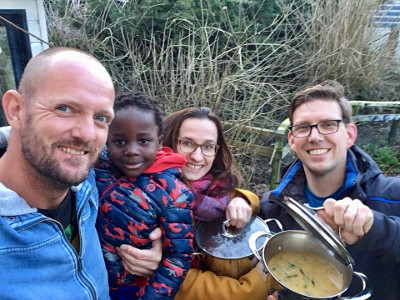 PHILIPSBURG:--- ‘As part of the United Nation’s 2030 Agenda on Sustainable Development, adopted in September 2015, the UN has recognized the importance of eradicating poverty in all forms. Poverty presents an enormous global challenge for the international community, as is a significant threat to sustainable development. In the spirit of global solidarity, the 2030 Agenda is focused on how best to meet the needs of the world’s poorest and most vulnerable citizens and acknowledges the role that the private sector must play in supporting the various organizations who have undertaken philanthropic efforts to implement the 2030 Agenda. Poverty exists in every country around the globe, from powerful industrial nations to developing countries. It continues to affect millions of people, regardless of their social and cultural situations, and is a barrier to true prosperity and equality,’ the UN website announces.
PHILIPSBURG:--- ‘As part of the United Nation’s 2030 Agenda on Sustainable Development, adopted in September 2015, the UN has recognized the importance of eradicating poverty in all forms. Poverty presents an enormous global challenge for the international community, as is a significant threat to sustainable development. In the spirit of global solidarity, the 2030 Agenda is focused on how best to meet the needs of the world’s poorest and most vulnerable citizens and acknowledges the role that the private sector must play in supporting the various organizations who have undertaken philanthropic efforts to implement the 2030 Agenda. Poverty exists in every country around the globe, from powerful industrial nations to developing countries. It continues to affect millions of people, regardless of their social and cultural situations, and is a barrier to true prosperity and equality,’ the UN website announces.
Sint Maarten
Eradicating poverty is a topic well known on Sint Maarten. Although defining a poverty line for Sint Maarten has not been completed, income poverty exists on the island. Sint Maarten does not have abject poverty, but pockets of poverty seem to exist in some neighborhoods, like in Dutch Quarter, Middle Region, Cay Bay, Over the Bank, Cole Bay areas. There are no large slum areas on Sint Maarten, although there are smaller areas on the Sint Maarten with a relatively high percentage of inadequate housing.
According to the Well-Being Survey done by the Department of STAT (2013-2014), more than 40 % of the households surveyed considered themselves in need, compared to 28.5 percent who consider themselves poor. Socially ‘being poor’ has a more permanent and somewhat stigmatic meaning, while ‘living in need’ is considered a less permanent and more socially acceptable state of being. Of those living in need, more than half (54.1 percent) feel that they are poor.
What has Sint Maarten been doing on the theme of poverty?
The Government of St. Maarten has been tackling poverty in many ways. One way was to undergo an exercise in 2014, to determine how severe the poverty on the island is.
With the Millennium Acceleration Framework (MAF) methodology government has undertaken a desk review of available data and resources; this was followed by exchanging dialogue with stakeholders, non-governmental organizations, civil society and the private sector on poverty alleviation, on core challenges and solutions. Those bilateral consultations with stakeholders have reflected into an outcome, which is written in the MAF report. This report includes a Country Action Plan for poverty alleviation.
The Government of Sint Maarten intends to embrace sustainable community development for its society to contribute to poverty eradication and environmental sustainability.
For more detailed information, check out our Website for the MAF Report and Action plan to accelerate progress on Poverty Alleviation, www.sintmaartengov.org
Next, to that, there are other initiatives within the several ministries, which deals with the people in need.
It is also widely known, that there are a wide variety of private and collaborative initiatives, and initiatives by NGO’s to hand out a hand to people in need. The amount of charity actions by those organizations has increased after the passing of the devastating hurricane Irma, last year the 6th of September.
‘Giving is not about making a donation, it’s about making a difference’, is a quote by Kathy Calvin, that hits the nail. That is exactly the kind of spirit, societies need, to cope with poverty and social needs.
An example of this on Sint Maarten is the initiative of Dirkjan Jansen de Jong, Joost and friends, whereby ‘people helping people and give back to the community’ is applied, since the passing of the hurricane Irma. De Jong says ‘The storm was horrifying for everyone but after the storm so much positive things happened, and they are still happening all around the island.
So many people who still dedicate so much of their time to helping other people, animals, and the environment. We started an initiative that by eating and drinking at the Freegan Food Café, you automatically donate to the Freegan Food Lunches. Every day 100 lunches are made and offered to areas on St. Maarten, where people are in need of basic essentials. Every day there will be a plant-based breakfast and lunch made with veggies. The Freegan Food Café (FFC) gets from (super)markets and restaurants on the island, their leftovers, on which are the base of our meals. Merchants market, Carpios and Kams Foodworld are our main sponsors so far. We also raise money for animal and environmental organizations. We do this because Love is a universal language and can be given and received in so many ways. With teamwork, we can make the dream work.’
St. Maarten’s Department of the Interior and Kingdom Relations (BAK) is the designated focal point for the Sustainable Development Goals (SDGs) and the 2030 Agenda on St. Maarten. Ms. Drs. L. Morales, program manager at BAK can be contacted for the MAF Report and to be part of the SDGs process. You can reach her via government email This email address is being protected from spambots. You need JavaScript enabled to view it. or per telephone number +1721-5271223.











